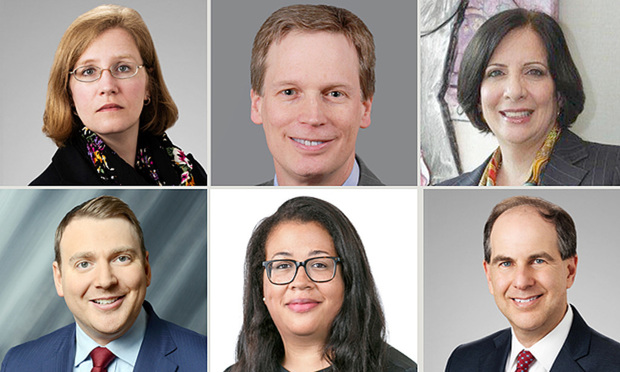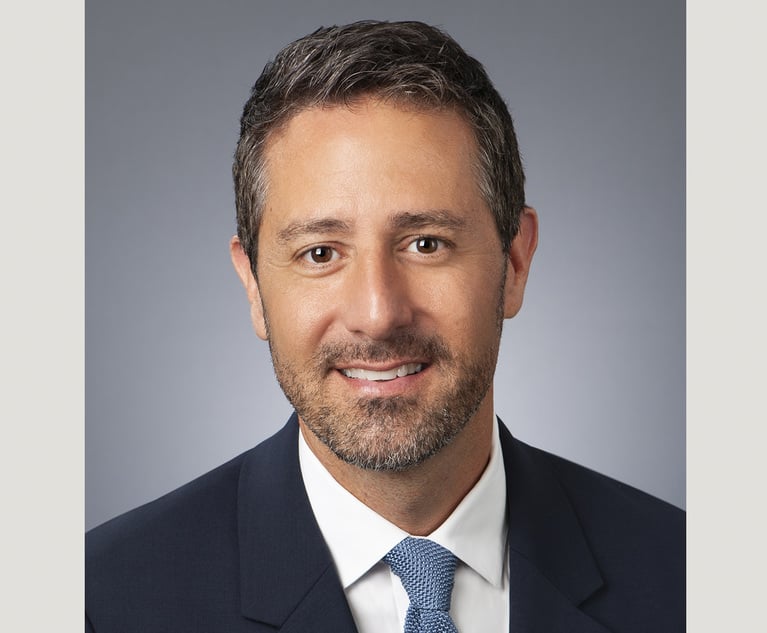Fintech Partners Are in High Demand as Practice Heats Up
Law firm hiring in financial technology practices is booming in 2019, with no slowdown in sight.
June 26, 2019 at 03:50 PM
5 minute read
 Top row L-R: Jenny Cieplak, Matthew Kluchenek and Vivian Maese. Bottom row L-R: Justin Steffen, Christine Trent Parker and Mitchell Rabinowitz.
Top row L-R: Jenny Cieplak, Matthew Kluchenek and Vivian Maese. Bottom row L-R: Justin Steffen, Christine Trent Parker and Mitchell Rabinowitz.
Pouncing on a growing business opportunity, law firms are expanding their financial technology-related practices and snapping up attorneys with relevant expertise.
Since the beginning of 2019, at least 26 lawyers with some fintech expertise have joined Am Law 200 firms as partners, according to ALM data. That's on top of a similarly high pace of fintech partner hires during the first six months of last year and appears to be higher than the number of fintech partner moves in the first halves of 2016 and 2017.
The increased demand for fintech expertise comes from both law firm clients in banking looking to go digital as well as from technology companies, such as payment apps, said Jon Truster, the co-head of lateral partner placement at Greene Levin Snyder. “I've heard from firms that they expect this to be a growth area,” Truster said.
As a result of the client interest, law firm demand for lawyers with fintech experience or to work on fintech teams has increased during the last three to four years, according to Jeff Lowe, the global practice leader of Major, Lindsey & Africa's law firm practice group.
Fintech is “nascent but growing, and a really great area for young lawyers,” Lowe said. “It's here to stay.”
So far this year, prominent fintech moves include Vivian Maese joining Cadwalader, Wickersham & Taft in New York from Latham & Watkins, which later added two prominent fintech partners, Mitchell Rabinowitz and Jenny Cieplak in Washington, D.C., from Crowell & Moring. Reed Smith brought on New York-based Christine Trent Parker, formerly special counsel at Sullivan & Cromwell; Hunton Andrews Kurth added Erin Fonté in Austin from Dykema Gossett, while Matthew Kluchenek joined Mayer Brown in Chicago from Baker McKenzie.
'Not a Fad'
Bitcoin, blockchain technology, smartphone payment apps and other forms of financial technology have risen to prominence in recent years. But the fintech industry has actually been around for more than two decades, according to Maese, who started her career as a lawyer on Wall Street. She said she classifies ATMs and early trading-floor applications on the New York Stock Exchange as early examples, and the fintech industry is currently in its “second wave.”
“The first wave was technology pushing its way from the back-office to front-office operations,” she said. “Much of the activity is now in the front office: technology changes how we see information and interact with customers. There's more capability in the technology and less human touch necessary.”
The financial services industry 10 years ago was 90% driven by tech, she said. “In the next decade, it will be 99%. It's not a fad. It's a fundamental change to an important industry in the world. That's why everyone is gearing up for it,” Maese added.
Justin Steffen, who moved in January from Jenner & Block to Ice Miller, has also observed higher demand in the legal industry for fintech expertise, especially in the last couple of years.
Steffen, who teaches a fintech law class at Loyola University Chicago School of Law, said while he considers fintech to be a broad term including “anyone who deals with money and does so with new or interesting technology,” it's only in the last year or so he has seen a few law schools specifically teach that application of the law. For instance, spring 2019 was the first semester Loyola offered the class, he said.
“It has moved from a novelty to an actual, legitimate practice,” he said.
Right now, much of the demand is for regulatory and transactional work, Lowe and other recruiters said. They, along with fintech partners who joined new firms this year, said there is also demand for attorneys with broad expertise in multiple areas that complement financial technology, such as intellectual property, compliance, finance and data privacy.
For example, Steffen, a litigator, became passionate about fintech on his own time. In the coming years, he said he expects his litigation expertise paired with his fintech passion will become more valuable to clients. ”You need to have a lot of different disciplines, because issues aren't necessarily housed in one sort of space,” he said.
Maese said that because fintech touches so many practice areas, expanding services in this industry is a chance for law firms to encourage more internal collaboration and teamwork.
“It becomes essential for lawyers to have a platform that can do all these things,” she said. “You can't stand in a silo and do fintech properly.”
The potential for high internal collaboration—and billing—on fintech issues among multiple practice areas makes it particularly appealing to law firms. Truster, the partner recruiter, also noted that fintech matters can extend into lending, accessing money and regulatory issues. “It's pretty broad,” he said. “I do think it's a moneymaker for firms and will continue to be.”
This content has been archived. It is available through our partners, LexisNexis® and Bloomberg Law.
To view this content, please continue to their sites.
Not a Lexis Subscriber?
Subscribe Now
Not a Bloomberg Law Subscriber?
Subscribe Now
NOT FOR REPRINT
© 2025 ALM Global, LLC, All Rights Reserved. Request academic re-use from www.copyright.com. All other uses, submit a request to [email protected]. For more information visit Asset & Logo Licensing.
You Might Like
View All
'Ridiculously Busy': Several Law Firms Position Themselves as Go-To Experts on Trump’s Executive Orders
5 minute read
Holland & Knight Hires Former Davis Wright Tremaine Managing Partner in Seattle
3 minute read
Am Law 200 Firms Announce Wave of D.C. Hires in White-Collar, Antitrust, Litigation Practices
3 minute read
Paul Hastings Hires Music Industry Practice Chair From Willkie in Los Angeles
Trending Stories
Who Got The Work
J. Brugh Lower of Gibbons has entered an appearance for industrial equipment supplier Devco Corporation in a pending trademark infringement lawsuit. The suit, accusing the defendant of selling knock-off Graco products, was filed Dec. 18 in New Jersey District Court by Rivkin Radler on behalf of Graco Inc. and Graco Minnesota. The case, assigned to U.S. District Judge Zahid N. Quraishi, is 3:24-cv-11294, Graco Inc. et al v. Devco Corporation.
Who Got The Work
Rebecca Maller-Stein and Kent A. Yalowitz of Arnold & Porter Kaye Scholer have entered their appearances for Hanaco Venture Capital and its executives, Lior Prosor and David Frankel, in a pending securities lawsuit. The action, filed on Dec. 24 in New York Southern District Court by Zell, Aron & Co. on behalf of Goldeneye Advisors, accuses the defendants of negligently and fraudulently managing the plaintiff's $1 million investment. The case, assigned to U.S. District Judge Vernon S. Broderick, is 1:24-cv-09918, Goldeneye Advisors, LLC v. Hanaco Venture Capital, Ltd. et al.
Who Got The Work
Attorneys from A&O Shearman has stepped in as defense counsel for Toronto-Dominion Bank and other defendants in a pending securities class action. The suit, filed Dec. 11 in New York Southern District Court by Bleichmar Fonti & Auld, accuses the defendants of concealing the bank's 'pervasive' deficiencies in regards to its compliance with the Bank Secrecy Act and the quality of its anti-money laundering controls. The case, assigned to U.S. District Judge Arun Subramanian, is 1:24-cv-09445, Gonzalez v. The Toronto-Dominion Bank et al.
Who Got The Work
Crown Castle International, a Pennsylvania company providing shared communications infrastructure, has turned to Luke D. Wolf of Gordon Rees Scully Mansukhani to fend off a pending breach-of-contract lawsuit. The court action, filed Nov. 25 in Michigan Eastern District Court by Hooper Hathaway PC on behalf of The Town Residences LLC, accuses Crown Castle of failing to transfer approximately $30,000 in utility payments from T-Mobile in breach of a roof-top lease and assignment agreement. The case, assigned to U.S. District Judge Susan K. Declercq, is 2:24-cv-13131, The Town Residences LLC v. T-Mobile US, Inc. et al.
Who Got The Work
Wilfred P. Coronato and Daniel M. Schwartz of McCarter & English have stepped in as defense counsel to Electrolux Home Products Inc. in a pending product liability lawsuit. The court action, filed Nov. 26 in New York Eastern District Court by Poulos Lopiccolo PC and Nagel Rice LLP on behalf of David Stern, alleges that the defendant's refrigerators’ drawers and shelving repeatedly break and fall apart within months after purchase. The case, assigned to U.S. District Judge Joan M. Azrack, is 2:24-cv-08204, Stern v. Electrolux Home Products, Inc.
Featured Firms
Law Offices of Gary Martin Hays & Associates, P.C.
(470) 294-1674
Law Offices of Mark E. Salomone
(857) 444-6468
Smith & Hassler
(713) 739-1250










